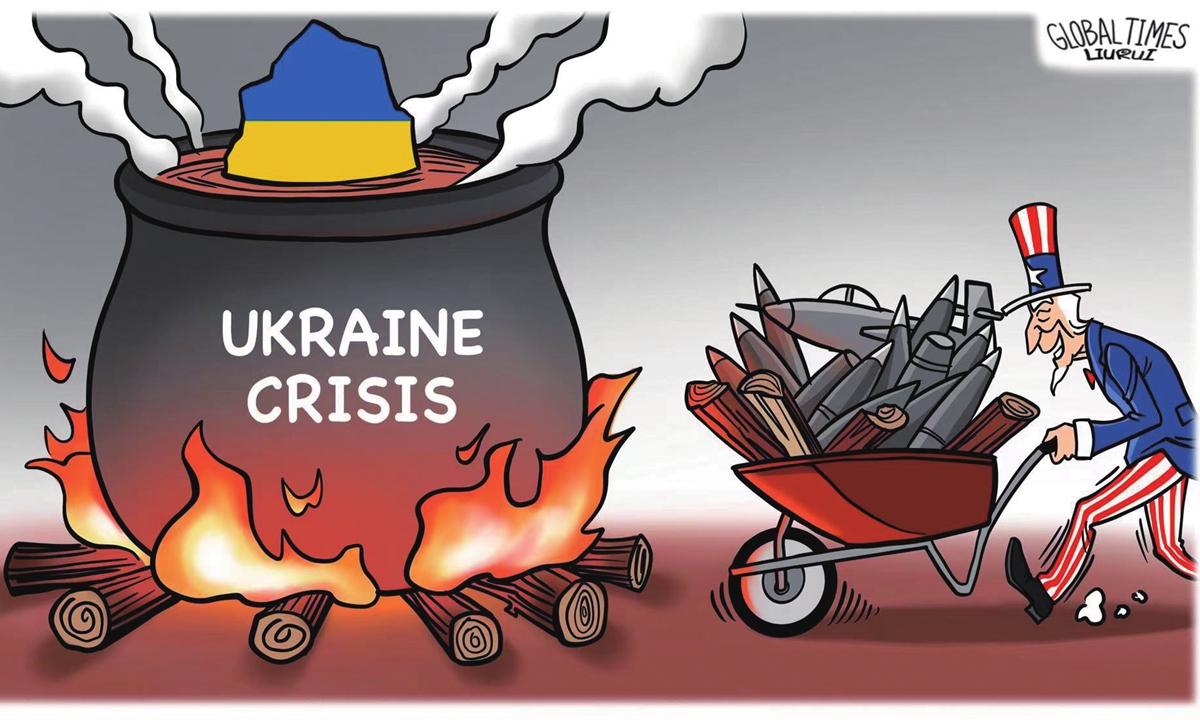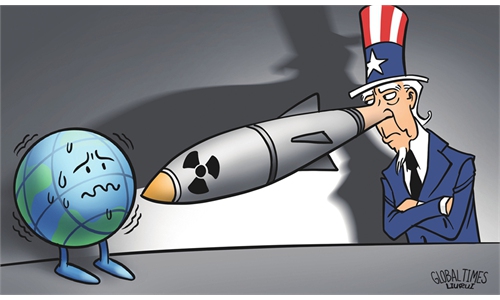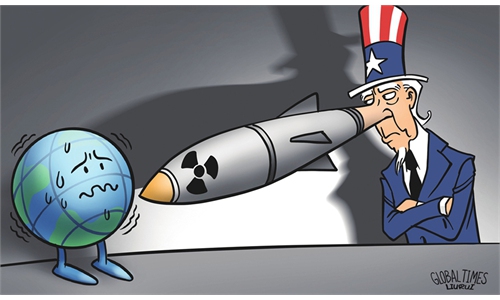Biden’s ‘Armageddon’ warning is preemptive strike in public opinion toward Russia

Illustration: Liu Rui/GT
Deterrence and counter-deterrence regarding nuclear weapons has continued to reverberate in the US and Europe. Ukrainian President Volodymyr Zelensky on Thursday called for the international community to "do preemptive strikes" instead of "waiting for Russian nuclear strikes" when asked about NATO's role in the conflict in an address to Sydney-based Lowy Institute via video link. This sparked Moscow's anger. Kremlin spokesman Dmitry Peskov called Zelensky's comments "nothing else than a call to start a world war.""Ukraine is now very anxious to end the war as soon as possible. With the appetite to defeat Russia, Ukraine hopes to encourage the US and the West to be directly involved in the conflict, and integrate with NATO," an expert on international relations who requested anonymity told the Global Times. "But Russia is a nuclear-armed country. If a direct military clash takes place between NATO and Russia, the possibility of a nuclear conflict remains, which will be a disaster not only for Europe, but for the whole world."
US President Joe Biden, as usual, poured oil on the flames of the ongoing Ukraine crisis. Reuters reported that Biden on Thursday made it clear he was keeping a wary eye on Putin and how he might react as Ukraine's military makes gains. "For the first time since the Cuban Missile Crisis, we have a direct threat to the use of nuclear weapons, if in fact things continue down the path they'd been going," Biden told Democratic donors in New York. "We have not faced the prospect of Armageddon since Kennedy and the Cuban missile crisis."
According to Yang Xiyu, a senior research fellow at the China Institute of International Studies, the analogy between the current situation of the Russia-Ukraine conflict and the Cuban Missile Crisis is inappropriate, especially the rhetoric that today's situation is as perilous as that in 1962. It cannot be denied that the present circumstance is dangerous, but it's still far away from that of 1962, when the US and the Soviet Union came closest to a nuclear conflict. During the Cuban Missile Crisis, there was evidence showing the two powers were engaging related operations of dealing with a nuclear war. But today, the military conflict is so far between Russian troops and Ukrainian ones, while the US and Russian troops are not in a direct military clash.
Biden has his own intent and calculation to compare today's nuclear risks with those of the Cuban Missile Crisis, that is, to launch preemptive strikes in the field of public opinion, in a bid to further occupy the moral high ground, push Russia into a passive position and pass all buck of war to Russia. This is one of Washington's approaches to maximize its indirect involvement in the Ukraine crisis, noted Yang.
The world should remember that Russia has nuclear weapons. If the US continues to ratchet up fanning the flame and stir up trouble, and does not discard the goal of exploiting Ukraine to defeat Russia, the result will be tragic for Europe.
Biden's provocation toward Russia is at odd with the appeal of the international community, which still wants to see the conflict to be settled by political means. In case of the escalation of the situation after Washington's repeated provocations, Ukraine, Russia, Europe, even the US and the rest of the world will be the victims. Biden's rhetoric once again mirrors his lack of responsibility.
Former German chancellor Angela Merkel on Thursday said Europe can achieve a lasting peace only with the involvement of Russia. It is true. And stopping the reliance on the US is the most effective way to achieve Europe's peace, said the expert requesting anonymity. As long as Europe still depends on Washington for its security, the US will seek to turn Europe into its tool to counter Russia. If Europe maintains its current relationship with the US, the continent can never achieve lasting peace.
The author is a reporter with the Global Times. luyuanzhi@globaltimes.com.cn



